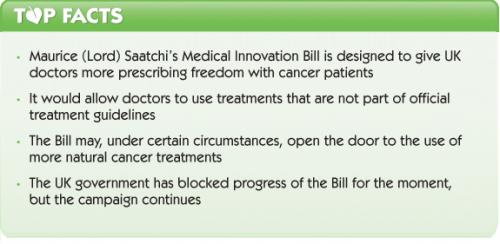Maurice (Lord) Saatchi’s Medical Innovation Bill offered the promise of greater access to innovative treatments for UK cancer patients. Yet not only has the UK government blocked progress of the Bill, but a government official declared that a cure for cancer already exists! What’s going on?

The Medical Innovation Bill and natural cancer treatment
After Maurice Saatchi watched his wife, author Josephine Hart, die a protracted and painful death from ovarian cancer in 2011, he swore to do something about it. His answer was a so-called Private Members’ Bill, the Medical Innovation Bill, which – if passed into law – would allow doctors more freedom to prescribe to cancer patients, with their agreement and under exceptional circumstances. Saatchi described cancer as “relentless, remorseless and merciless” in a September interview with the BBC’s Andrew Marr, and accused cancer treatment of being “mediaeval, degrading and ineffective”.
Many, including ourselves, have good reason to agree with Saatchi. And, although the Medical Innovation Bill is clearly designed to give doctors additional freedom to try orthodox cancer treatments that are not part of ‘standard care’ and government-approved cancer treatment guidelines, it may also open the door to more natural, innovative and less damaging cancer therapies.
Article 2 of the proposed Bill states that doctors may depart from the “pre-existing range of acceptable treatments for the condition” in cases where evidence is lacking. In doing so, he or she must weigh up factors like the likelihood of success and the consequences of using, or not using, the proposed unlicensed treatment: the Bill is deliberately structured to dissuade “mavericks” or “snake oil salesmen” from using patients as guinea pigs. Under these conditions, it is easy to envisage a situation where an enlightened physician would opt to try one of the myriad non-orthodox cancer treatment options. On the other hand, the requirement to take into account the opinions of the patient’s multi-disciplinary management team would greatly limit their use in practice. But it’s a start.
UK government content with failure
The Medical Innovation Bill received its first reading in the House of Lords on 3rd December last year. On 17th October 2013, however, the UK government announced it was opposing the Bill, effectively blocking its progress through Parliament. Officials at the Department for Health (DoH) told Saatchi’s team that the Bill was “unnecessary,” to which Saatchi responded, “They think it's unnecessary because there is no problem with cancer innovation, there’s no need for clarification of the law or for codifying best practise.” The UK government appears happy to see UK cancer survival statistics languish behind those of other countries.
Stop press! 'Cure for cancer' announced!
Bizarrely, when informing Saatchi of its decision, a DoH official told him that, “There is a cure for cancer”. And this wasn’t just any official – it was “The most senior officer in the [DoH], responsible for medical innovation in Britain”. Huge news! Most likely, this official believes that chemotherapy, radiotherapy and surgery, AKA the existing “mediaeval, degrading and ineffective” standard NHS cancer treatment, represents a cure. But if not, someone should tell Neon Roberts and his family, and others in similar unenviable positions, ASAP.
History tells us that making the UK’s National Health Service (NHS) lithe and responsive to the latest scientific developments in cancer treatment for the benefit of patients is akin to getting a supertanker to do a neat U-turn in a marina. We await with bated breath whatever the DoH intends to lay out for cancer patients, and hope it’s not just another cynical ploy from the ‘cancer establishment’.
Pharma involvement?
What’s also interesting is the muted reaction of the UK media to the blocking of Saatchi’s Bill. Only the Daily Telegraph covered the story, in contrast with widespread interest when the Bill was first announced. We can only speculate why this might be. Is it possible that the pharmaceutical industry didn’t like the potential for competition offered by the Bill, and put pressure on the government to block it? Media and pharma are basically owned and controlled by the same people, and it may be in pharma’s interests to bury the story – thereby heading off any protest at the blocking of a potentially popular measure. Who knows?
According to spokesman Dominic Nutt, “Scientists, doctors, patients and many politicians see the need for the Bill and back it. Support is growing. The campaign continues.” Let’s hope that the Bill is resurrected in the near future. We’ll keep you informed all the way.
ANH Health Choice campaign








Comments
your voice counts
30 October 2013 at 9:26 pm
This shows that the so called UK-government like many others have been taken over by the, not long anymore, big pharma.
01 November 2013 at 2:09 pm
Since my father died in 1960, cancer treatment has not moved on. They may have refined it slightly but it is still basically 'cut, burn and poison'
I am convinced that in 50 - 100 years time we hopefully will look back on this medieval treatment in the same way that we look back on the stupidity of treating syphilis with mercury.
Whilst governments stay 'in bed' with Big Pharma, we have to take our health into our own hands and learn how to grow, make and use herbal medicine as our ancestors did.
06 November 2013 at 10:46 am
“You never change things by fighting the existing reality.
To change something, build a new model that makes the existing model obsolete.”
? Richard Buckminster Fuller
Don't fight these people. They will never change. Become so radical that you build an entirely new system that replaces everything ! Welcome to the 21st century.
Your voice counts
We welcome your comments and are very interested in your point of view, but we ask that you keep them relevant to the article, that they be civil and without commercial links. All comments are moderated prior to being published. We reserve the right to edit or not publish comments that we consider abusive or offensive.
There is extra content here from a third party provider. You will be unable to see this content unless you agree to allow Content Cookies. Cookie Preferences